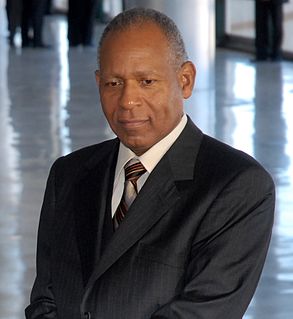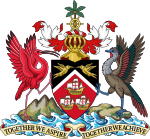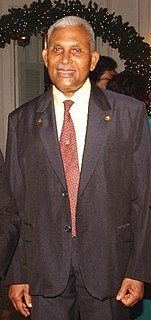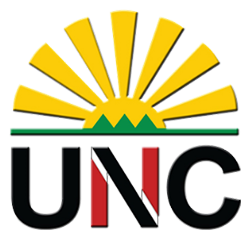The history of Trinidad and Tobago begins with the settlements of the islands by Amerindians, specifically the Island Carib and Arawak peoples. Both islands were explored by Christopher Columbus on his third voyage in 1498. Trinidad remained in Spanish hands until 1797, but it was largely settled by French colonists. Tobago changed hands between the British, French, Dutch, and Courlanders, but eventually ended up in British hands following the second Treaty of Paris (1814). In 1889 the two islands were incorporated into a single crown colony. Trinidad and Tobago obtained its independence from the British Empire in 1962 and became a republic in 1976.

The politics of Trinidad and Tobago function within the framework of a unitary state regulated by a parliamentary democracy modelled on that of Great Britain and Northern Ireland, from which the country gained its independence in 1962. Under the 1976 republican Constitution, the British monarch was replaced as head of state by a President chosen by an electoral college composed of the members of the bicameral Parliament, consisting of the Senate and the House of Representatives.

Patrick Augustus Mervyn Manning was a Trinidadian politician who was the fourth and sixth Prime Minister of Trinidad and Tobago; his terms ran from 17 December 1991 to 9 November 1995 and from 24 December 2001 to 26 May 2010. He was also Political Leader of the People's National Movement (PNM) from 1987 to 2010. A geologist by training, Manning served as Member of Parliament for the San Fernando East constituency from 1971 until 2015 when he was replaced by Randall Mitchell and was the longest-serving member of the House of Representatives. He was the Leader of the Opposition from 1986 to 1990 and again from 1995 to 2001.

The United Labour Front (ULF) was a political party in Trinidad and Tobago and the main opposition party between 1976 and 1986.

The Democratic Action Congress (DAC) was a Tobago-based political party in Trinidad and Tobago.

The Democratic Labour Party (DLP) was the main opposition party in Trinidad and Tobago between 1957 and 1971. The party was the party which opposed the People's National Movement (PNM) at the time of Independence. After several splits brought about by leadership struggles, the party lost its hold on the Indo-Trinidadian community in the 1976 General Elections and was displaced in parliament by the United Labour Front under the leadership of Basdeo Panday. The party was the representative of the ethnic Indian community in the country; however Indian Muslims were said to be less loyal to the party than Indian Hindus.

Colm Imbert is the Member of Parliament for the constituency of Diego Martin North/East, which he has represented since December 1991.

Early general elections were held in Trinidad and Tobago on 7 October 2002, after People's National Movement leader Patrick Manning had failed to secure a majority in the hung parliament produced by the 2001 elections. This time the PNM was able to secure a majority, winning 20 of the 36 seats. Voter turnout was 69.6%.
Dr Linda Baboolal is a Trinidadian physician. She has served as her country's Minister of Social Services and Minister of Health, the first female Chairperson of the People's National Movement party, and as President of the Senate of Trinidad and Tobago (2002–2007).

General elections were held in Trinidad and Tobago on 7 September 2015. The date of the general elections was announced by Prime Minister Kamla Persad-Bissessar on 13 June 2015. The result was a victory for the opposition People's National Movement, which received 52% of the vote and won 23 of the 41 seats in the House of Representatives.
Anthony Isidore Smart is a Trinidadian politician and lawyer. He served as a Member of Parliament from December 1986 to November 1991 and Attorney General of Trinidad and Tobago from March 1989 to November 1991. He was also Political Leader of the National Alliance for Reconstruction (NAR) from April 2000 to November 2001. He currently serves as Chairman of the Board of Directors of the First Citizens Bank since June 17, 2014.
Local elections were held in Trinidad on Monday November 28, 2016, slightly more than one month later than originally planned. Elections were held to select the membership of 14 local authorities, with representatives elected from 137 single-member districts across the country. The entire membership of Trinidad's local government was renewed as a result of these elections, with the previous set of local representatives having been elected in 2013. The elections came roughly a year following the 2015 parliamentary general election.











